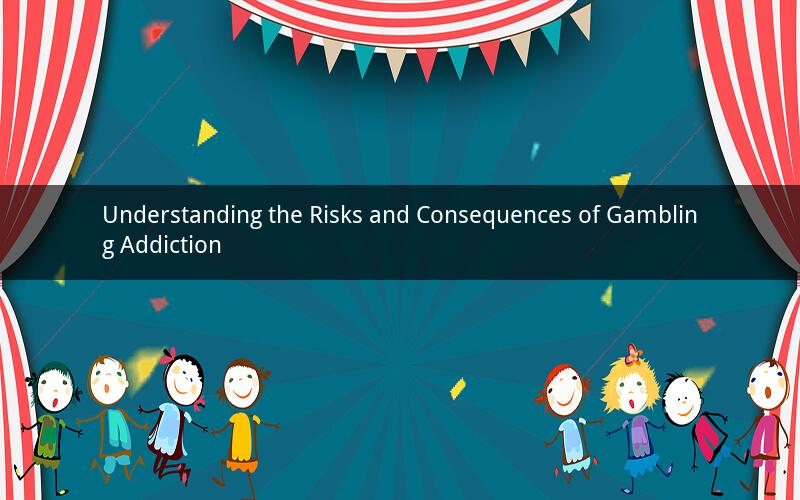
Introduction:
Gambling addiction, often referred to as problem gambling, has become a significant concern in recent years. This article delves into the dangers associated with gambling addiction, its impact on individuals and society, and the available resources for those seeking help.
1. The Dangers of Gambling Addiction:
Gambling addiction is a harmful condition that can lead to severe consequences for individuals and their families. Here are some of the dangers associated with this addiction:
a. Financial Loss: One of the most immediate dangers of gambling addiction is the potential for significant financial loss. Individuals may borrow money, max out credit cards, or even steal to fund their gambling habits, leading to severe financial distress.
b. Emotional and Psychological Impact: Gambling addiction can cause a range of emotional and psychological issues, including depression, anxiety, and low self-esteem. These issues can exacerbate existing mental health conditions or lead to the development of new ones.
c. Relationship Strain: The consequences of gambling addiction can strain relationships with family, friends, and colleagues. Betrayal, financial stress, and emotional turmoil can lead to fractured relationships and a sense of isolation.
d. Legal and Criminal Consequences: In some cases, individuals with gambling addiction may engage in illegal activities to fund their habits, such as fraud or theft. This can result in legal repercussions, including fines, imprisonment, or even the loss of employment.
2. The Impact of Gambling Addiction on Society:
The dangers of gambling addiction extend beyond the individual to affect society as a whole. Here are some of the broader consequences:
a. Economic Impact: Problem gambling can lead to a significant economic burden on society, including lost productivity, increased healthcare costs, and the need for social services to support individuals struggling with addiction.
b. Social Impact: The emotional and psychological distress caused by gambling addiction can lead to social problems, such as domestic violence, substance abuse, and even suicide.
c. Public Health Concerns: Problem gambling can contribute to a range of public health issues, including mental health disorders, substance abuse, and even cardiovascular diseases.
3. Resources for Help and Support:
Recognizing the dangers of gambling addiction is the first step towards seeking help. Here are some resources available for individuals struggling with gambling addiction:
a. Professional Help: Therapists, counselors, and addiction specialists can provide personalized support and treatment for gambling addiction. They can help individuals develop coping strategies, address underlying issues, and regain control of their lives.
b. Support Groups: Joining a support group, such as Gamblers Anonymous, can provide individuals with a sense of community and understanding. These groups offer a safe space to share experiences and receive encouragement from others who have faced similar challenges.
c. helplines and Hotlines: Many organizations offer helplines and hotlines for individuals seeking immediate assistance. These resources provide confidential support, guidance, and information on available treatment options.
4. Preventing Gambling Addiction:
While it is impossible to completely eliminate the risk of gambling addiction, there are steps individuals can take to reduce their chances of developing this harmful condition:
a. Education: Understanding the dangers of gambling addiction can help individuals make informed decisions about their gambling habits. Educating oneself about responsible gambling and the signs of addiction is crucial.
b. Setting Limits: Establishing and adhering to personal gambling limits can help prevent excessive spending and reduce the risk of developing an addiction.
c. Seeking Support: If individuals notice signs of gambling addiction in themselves or someone they know, it is essential to seek support promptly. Early intervention can significantly improve the chances of overcoming addiction.
5. Conclusion:
Gambling addiction is a dangerous addiction that can have severe consequences for individuals and society. Recognizing the risks, seeking help, and taking preventive measures are essential steps towards overcoming this harmful condition. By understanding the dangers of gambling addiction and the available resources for support, individuals can take control of their lives and move towards a healthier future.
Questions and Answers:
1. What are the main signs of gambling addiction?
Answer: The main signs of gambling addiction include a preoccupation with gambling, a need to increase the amount of money or time spent gambling, unsuccessful attempts to stop gambling, and the continuation of gambling despite negative consequences.
2. How can gambling addiction affect a person's financial stability?
Answer: Gambling addiction can lead to significant financial loss, including the depletion of savings, maxing out credit cards, and even borrowing money or engaging in illegal activities to fund gambling habits.
3. What types of therapy are available for gambling addiction?
Answer: Therapy for gambling addiction can include individual counseling, group therapy, cognitive-behavioral therapy (CBT), and motivational interviewing. These approaches help individuals develop coping strategies, address underlying issues, and regain control of their lives.
4. How can family and friends support someone struggling with gambling addiction?
Answer: Family and friends can support someone with gambling addiction by offering empathy, understanding, and non-judgmental support. Encouraging them to seek professional help, attending support groups with them, and being a source of encouragement can also be beneficial.
5. Are there any legal implications for gambling addiction?
Answer: Yes, gambling addiction can lead to legal implications, especially if individuals engage in illegal activities to fund their gambling habits. This can include fraud, theft, or other criminal activities, which can result in fines, imprisonment, or the loss of employment.